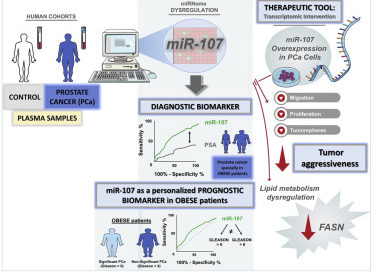A recently published Open Access article represents the first demonstration that the plasma levels of miR-107 might represent a useful personalized diagnostic biomarker of prostate cancer since its levels are increased in plasma from prostate cancer patients compared with control subjects using two independent cohorts. The results provide new, compelling evidence supporting the contention that miR-107 represents a promising diagnostic, prognostic, and/or therapeutic tool, worth to be further explored, in the pathological association between prostate cancer and obesity.

Graphical Abstract.
Prostate-specific antigen (PSA) is the gold standard biomarker currently used for prostate cancer screening, but has several limitations, such as the lack of specificity and sensitivity. Therefore, there is an urgent need to develop new tools to diagnose prostate cancer earlier and better.
MicroRNAs (or miRNAs) are small single-stranded non-coding RNA molecules that function in RNA regulating gene expression. MicroRNAs have emerged as potential sources of non-invasive diagnostic biomarkers in several pathologies, as they can be analysed in plasma, and obtained from a simple blood extraction.
In this study, whose results were recently published in Molecular Therapy – Nucleid Acids, the team assessed for the first time, the dysregulation of whole plasma miRNome in prostate cancer patients. They also studied its specific implication in obese patients with prostate cancer (body mass index > 30).
The initial study cohort included 18 controls and 19 prostate cancer patients, and another independent cohort for validation included 135 controls and 160 prostate cancer patients.
The team of researchers found out that miR-107 was the most profoundly altered miRNA in prostate cancer. miR-107 levels are increased in plasma from prostate cancer patients compared with the control subjects. The measured levels of miR-107 also significantly outperformed the ability of the PSA to distinguish between healthy individuals and prostate cancer patients and correlated with relevant clinical parameters. The results were even more significant in the group of obese patients with prostate cancer.
The publication concludes that the study represents the first demonstration that the plasma levels of miR-107 might represent a novel and useful personalized diagnostic and prognostic biomarker of prostate cancer, and especially so for obese patients.
Furthermore, towards the objectives of the ProsCanGO project, an in silico analysis revealed the association of miR-107 with the splicing process, a process responsible for the maturation of RNA. The study revealed that miR-107 overexpression in prostate cancer cell lines altered the expression of key splicing process associated genes. This suggests an alteration of this cellular mechanism. Since the oncogenic splicing variant of the ghrelin hormone, the In1-ghrelin, is overexpressed in prostate cancer, the alteration promoted by miR-107 on the splicing process could alter In1-ghrelin expression.
The study was led by the IMIBIC group GC27 OncObesity and Metabolism in collaboration with several clinical units of the Reina Sofia University Hospital, namely Urology, Lipids and Atherosclerosis, and Endocrinology and Nutrition, as well as with researchers of the Spanish Biomedical Research Centre in Physiopathology of Obesity and Nutrition (CIBERobn) and the Department of Cell Biology, Physiology and Immunology of the University of Cordoba. André Sarmento-Cabral gave support to the study design and helped with the data analysis and interpretation, and the manuscript writing and revision.
Access to the article via Zenodo.
Cite as:
Vicente Herrero-Aguayo, Prudencio Sáez-Martínez, Juan M Jiménez-Vacas, M Trinidad Moreno-Montilla, Antonio J Montero-Hidalgo, Jesús M Pérez-Gómez, Juan L López-Canovas, Francisco Porcel-Pastrana, Julia Carrasco-Valiente, Francisco J Anglada, Enrique Gómez-Gómez, Elena M Yubero-Serrano, Alejandro Ibañez-Costa, Aura D Herrera-Martínez, André Sarmento-Cabral, Manuel D Gahete, & Raúl M Luque. (2022). Dysregulation of the miRNome unveils a crosstalk between obesity and prostate cancer: miR-107 asa personalized diagnostic and therapeutic tool. Molecular Therapy. Nucleic Acids, 27, 1164–1178. https://doi.org/10.1016/j.omtn.2022.02.010

